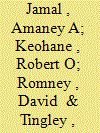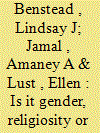|
|
|
Sort Order |
|
|
|
Items / Page
|
|
|
|
|
|
|
| Srl | Item |
| 1 |
ID:
140187


|
|
|
|
|
| Summary/Abstract |
Systematic investigation of attitudes expressed in Arabic on Twitter towards the United States and Iran during 2012–13 shows how the analysis of social media can illuminate the politics of contemporary political discourses and generates an informative analysis of anti-Americanism in the Middle East. We not only analyze overall attitudes, but using a novel events-based analytical strategy, we examine reactions to specific events, including the removal of Mohamed Morsi in Egypt, the Innocence of Muslims video, and reactions to possible U.S. intervention in Syria. We also examine the Boston Marathon bombings of April 2013, in which the United States suffered damage from human beings, and Hurricane Sandy, in which it suffered damage from nature. Our findings reinforce evidence from polling that anti-Americanism is pervasive and intense, but they also suggest that this animus is directed less toward American society than toward the impingement of the United States on other countries. Arabic Twitter discourses about Iran are at least as negative as discourses about the United States, and less ambivalent. Anti-Americanism may be a specific manifestation of a more general phenomenon: resentment toward powerful countries perceived as interfering in national and regional affairs.
|
|
|
|
|
|
|
|
|
|
|
|
|
|
|
|
| 2 |
ID:
140188


|
|
|
|
|
| Summary/Abstract |
Do voters regard male and female candidates equally? Does apparent religiosity of candidates help or hurt their electoral chances? Where biases exist, what explains them? We present a novel explanation of political bias, drawing from role congruity theory. It posits that political contexts shape citizens' perceptions of qualities that make a “capable leader,” which subsequently drives their willingness to vote for candidates. Evidence from a survey experiment embedded in the 2012 Tunisian Post-Election Survey demonstrates that this theory explains biases based on gender and religiosity better than dominant modernization and social identity theories. Moreover, these mechanisms are also likely to drive political biases related to other features and in other countries. This has important implications for policymakers aiming to reduce political biases in Tunisia, the MENA, or globally. It should encourage them to pay careful attention to stereotyped traits of underrepresented groups and successful leaders, and to use institutional solutions (e.g., electoral quotas) to shape expectations about underrepresented groups and leadership.
|
|
|
|
|
|
|
|
|
|
|
|
|
|
|
|
|
|
|
|
|